Posts Tagged ‘UN High Commissioner for Refugees’ (14 found)
South-East Asia: Irregular Maritime Movements (January-June 2014)
 GENEVA, (UNHCR) – A new UNHCR report on irregular maritime movements in Southeast Asia estimates that 20,000 people risked their lives in sea crossings in the first half of this year. Many were Rohingya who fled Myanmar and arrived in the region suffering the effects of malnutrition and abuse during the journey. Several hundred people were also intercepted on boats heading to Australia.
GENEVA, (UNHCR) – A new UNHCR report on irregular maritime movements in Southeast Asia estimates that 20,000 people risked their lives in sea crossings in the first half of this year. Many were Rohingya who fled Myanmar and arrived in the region suffering the effects of malnutrition and abuse during the journey. Several hundred people were also intercepted on boats heading to Australia.
The report was produced by UNHCR’s Bangkok-based Maritime Movements Monitoring Unit, which collates information through interviews, and from media reports, partners and governments. It focuses on departures from the Bay of Bengal and elsewhere passing through Southeast Asia, and highlights the abuses people are facing on their journeys, and developments related to Australia’s Operation Sovereign Borders policy.
It also shows that more than 7,000 asylum-seekers and refugees who have travelled by sea are at present held in detention facilities in the region, including over 5,000 in Australia or its offshore processing centres in Nauru and Papua New Guinea […]
• • •Profiling Survey Stokes Refugee Fears
 Last Thursday, 20 June, marked World Refugee Day and events were held highlighting the plight of refugees throughout the world, including a United Nations High Commissioner for Refugees (UNHCR) organized event held at the Myanmar Peace Centre in Rangoon. According to the UNHCR, there are around 650,000 displaced people in Burma and around 150,000 refugees on the Thailand-Burma border, many of whom were born there. Yet as the discourse from the government of Burma and the international community is moving towards repatriation for those on the border, anxiety is building with refugees worrying that they will be forced to return to a place where they will live in fear of conflict, will have no livelihood opportunities, and no land to call home.
Last Thursday, 20 June, marked World Refugee Day and events were held highlighting the plight of refugees throughout the world, including a United Nations High Commissioner for Refugees (UNHCR) organized event held at the Myanmar Peace Centre in Rangoon. According to the UNHCR, there are around 650,000 displaced people in Burma and around 150,000 refugees on the Thailand-Burma border, many of whom were born there. Yet as the discourse from the government of Burma and the international community is moving towards repatriation for those on the border, anxiety is building with refugees worrying that they will be forced to return to a place where they will live in fear of conflict, will have no livelihood opportunities, and no land to call home.
In recent weeks, a survey initiated by the Thai government and the UNHCR, and implemented by the Mae Fah Luang Foundation, an organization under Thai royal patronage, is being carried out, profiling refugees in Mae La camp. The survey has been heavily criticised as having insufficient input from refugees, and being designed to favour repatriation, and is thus stoking the refugees’ anxiety. The rationale behind the profiling is based on the UNHCR’s “preparation” for return, in that when the conditions for refugee return are right, relevant stakeholders will be sufficiently prepared to assist in a durable return to Burma. According to the UNHCR, “The profiling process will be a fully consultative and participatory process, where the refugees will be involved in every step. The questionnaire will be designed through consultations with the refugees.” Yet the reality of refugees’ participation in the process has been flawed and many refugees feel that the survey reflects a strong preference for return to Burma as the only viable solution, as opposed to staying in Thailand or resettling to a third country […]
UNHCR Gears Up for Humanitarian Response in Myanmar
Following the sudden escalation of violence some 10 days ago, the situation in Myanmar’s Rakhine state remains tense. The efforts of Myanmar authorities to restore law and order are continuing. There are, however, reports of sporadic incidents and violence.
According to initial government estimates, at least 48,000 people have been displaced by the violence that erupted last week. We expect this number to continue to grow as further information becomes available […]
• • •The First Handbook for Refugees Rights in Burmese Language Published
The Burma Refugee Organization (BRO) based in Malaysia, has just published Protecting Refugees and Their Rights by Alinsek, a Burmese human rights and social activist on 30 June 2010, as first ever handbook for refugees in Burmese language […]
• • •








 All posts
All posts